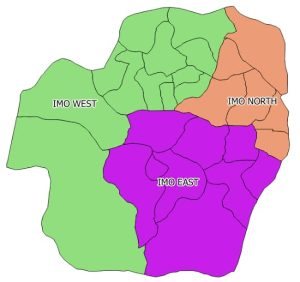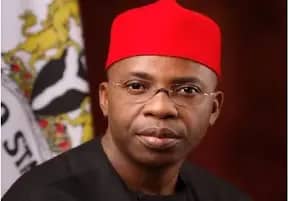

Across Nigeria, at both national and subnational levels, the call for balanced representation in leadership that reflects the various demographics of the people, has become a moral imperative.
Nowhere is this cry louder—or more just—than in Imo State, where the long-standing demand for a binding and inclusive Charter of Equity continues to resonate powerfully.
This Charter, long overdue, is premised on a simple truth: that for peace to endure and democracy to flourish, leadership must reflect justice, fairness, and equitable distribution of power among all components of the state.
Specifically, in Imo State, this means the fair rotation of the governorship and other key political positions among its three senatorial zones—Orlu (Imo West), Owerri (Imo East), and Okigwe (Imo North).
As the political climate intensifies ahead of the 2028 gubernatorial election, calls for this long-sought equity have once again come to the fore.
But troublingly, some self-appointed individuals—operating under the ambiguous banner of the “Imo Elders Council”—have taken it upon themselves to unilaterally determine the course of this Charter.
Predominantly comprised of persons from Owerri Zone, this council neither reflects the demographic breadth nor carries the moral legitimacy and authority required to speak on behalf of all Ndi Imo.
Their decision like that of every other stakeholder in the state are at best recommendations to Ndi Imo, therefore can’t be taken as a collective decision.
Most Imo people are for a Charter of Equity, true Charter of Equity that will endure the test of time.
A true Charter of Equity therefore cannot—and must not—be the product of exclusivity, back door arrangements, or sectional interests.
It must be a product of deliberate, inclusive, and transparent consultation, involving all zones, all ethnic and religious constituencies, and all socio-political stakeholders in the state.
It must address not only the governorship but extend to the deputy governorship, the speakership of the House of Assembly, and other key political appointments such as commissioners, ministers, and board chairmen.
A charter of equity that will be passed down from one generation of Ndi Imo to another without disruptions.
A charter of equity that’s deliberate, holistic, just and fair and above all, a Charter of Equity that is based on principles of freedom, equality, and justice, while consolidating the peace and unity of the people.
History Must Be Remembered, Not Rewritten – the story of Imo Charter of Equity must be grounded in truth, not revisionism.
Any charter of equity that ignores the proverbial rain in which Ndimo forgets where the rain began beating them will ultimately fail.
In 1999, Chief Achike Udenwa of Orlu Zone emerged governor of the State and served two full terms under the PDP.
In 2007, Chief Ikedi Ohakim of Okigwe Zone disrupted the prevailing political arrogance, proved wrong political pundits, pulled off an electoral upset and ascended to the governorship of the state under the banner of the lesser-known Progressive Peoples Alliance (PPA), defeating the almighty PDP—a feat few believed was possible.
With Ohakim’s emergence, Imo was set on a promising trajectory—a natural evolution towards equity.
But this trajectory was violently disrupted and interrupted by a campaign of orchestrated falsehood.
The malicious and now-debunked allegation that Chief Ohakim assaulted a Catholic priest was exploited to mobilize a political and religious backlash against him, primarily led by powerful interests in Owerri Zone.
The result: Ohakim was denied a second term and Okigwe Zone was unjustly deprived of its right to complete the customary eight-year tenure.
Instead, Rochas Okorocha, an Orlu son, was propelled into office in 2011. Backed tacitly by political interests in Owerri Zone, this shift shattered the spirit of equity.
Okorocha would go on to serve two terms, followed briefly by Chief Emeka Ihedioha of the Owerri Zone, whose tenure was truncated after just seven months by a Supreme Court ruling that installed Senator Hope Uzodinma—again, from Orlu Zone as governor of the state.
Uzodinma has since won reelection and is on track to complete another eight-year tenure.
It should be emphasized that Uzodinma’s land slide victory was guaranteed as he was the most viable option amongst the three major contenders of the position, so Imo people recognized that and came out enmasse to give him their support.
His groundswell victory was also a result of his mastery of Imo politics, financial resources at his disposal and hard work in which he mobilized Ndi Imo behind him.
It was never a result of Imo Charter of Equity as being peddled and advanced in some quarters.
The Question Now: What Next for Imo? As 2028 approaches, some factions from Owerri Zone—through media campaigns and dubious declarations—are attempting to foist a one-sided narrative that power must automatically return to them.
They claim Governor Uzodinma has endorsed this agenda. This is not only false but a dangerous distortion of facts.
It is a brazen attempt at political blackmail, aimed at hoodwinking and stampeding the governor and the people of Imo into validating a flawed process and decision that excluded critical voices.
This cacophony of voices must be stopped and stopped now to save Imo from eminent political downward spiral.
Governor Uzodinma, whose leadership has so far brought notable transformation and political stability to the state, must not lend credence to such a scheme.
To do so would compromise the legacy of his administration and risk plunging the state into a vortex of sectional conflict.
Equity Must Be Built on Justice, Not Entitlement – for too long, state resources—over 80% of which are reportedly spent annually developing Owerri—have been disproportionately deployed at the expense of other areas of the state that have been historically neglected.
Equity must consider not just geography but resource contribution, historical marginalization, and developmental imbalances.
The people of Okigwe Zone, having had their legitimate turn denied deserve a fair and unprejudiced consideration.
Any attempt to dismiss the aspirations of Okigwe and other very important blocks in the state will deepen the rifts in Imo’s political and communal fabric.
A Way Forward: Institutionalizing Equity – to enshrine justice, Governor Uzodinma should immediately transmit to the Imo State House of Assembly an executive bill for establishment of a statutory body of whatever name.
This body should have clearly defined and natural membership criteria rooted in merit, service, and representation.
Its membership composition clause should state unequivocally and unambiguously that its membership shall be open to all former presidents and vice presidents of Imo State origin.
ormer governors and deputy governors,
Former Senators and members of the House of Representatives, former ministers and federal commissioners of Imo State origin.
Former members of Imo State House of Assembly, retired generals, police commissioners, and senior security officers of Imo State origin.
Former local government chairmen, former academic leaders—vice chancellors, provosts and rectors, government recognized traditional rulers and respected clergy.
Retired justices and retired top civil servants of rank of permanent secretary, all of whom shall be within a specific age bracket of say 65 to 85 years old.
This legally constituted and reformed body should have a six-month mandate to produce a binding, comprehensive and widely accepted Imo Charter of Equity that reflects the yearnings, contributions, and interests of every segment of Imo society.
Conclusion: Equity Must Be Earned, Not Claimed – Imo must not allow the future to be dictated by political expediency, sectional arrogance, or emotional blackmail.
The next chapter must be written by a coalition of justice, not conspiracy; of dialogue, not deception.
Chief Ikedi Ohakim, a man unjustly denied, a voice of moderation and seasoned leadership and an administrstor, represents the fairest and most unifying choice in 2028.
His return would not only restore justice but also symbolize Imo’s collective maturity in placing fairness above faction, and equity above ego.
He should do one term to complete eight years of Okigwe zone, after which power should be returned to Owerri Zone for eight years and then to Orlu Zone for eight years.
Power shall then continue to rotate amongst the three senatorial districts in alphabetical order of names – Okigwe, Orlu and Owerri.
Let all stakeholders therefore rise to the moment. Let justice speak louder than ambition.
And let a new dawn of unity and true equity break upon the land of Ndi Imo. Such an inclusive society I must emphasize must be one based on the principles of embracing – not coercing or forcing, it is one in which diversity and using participatory processes that involve all stakeholders in the decision-making that affects their lives is employed.
About the Author
Bishop C. Johnson, a retired United States Army Captain and a social commentator continues to scrutinize Nigeria’s political landscape from his rural agricultural village in Egbema Imo State but you can reach him at b.chuck.johnson@gmail.com.






